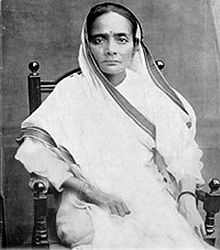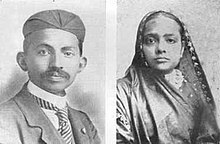This is an old revision of this page, as edited by 63.138.132.20 (talk) at 16:42, 12 November 2012. The present address (URL) is a permanent link to this revision, which may differ significantly from the current revision.
Revision as of 16:42, 12 November 2012 by 63.138.132.20 (talk)(diff) ← Previous revision | Latest revision (diff) | Newer revision → (diff)| Kasturba Mohandas Gandhi | |
|---|---|
 | |
| Born | (1869-04-11)11 April 1869 Porbandar, Kathiawar Presidency, British India |
| Died | 22 February 1944(1944-02-22) (aged 74) Aga Khan Palace, Poona, Bombay Province, British India |
| Other names | Baa |
| Known for | Wife of Mohandas Karamchand Gandhi |
Kasturba Mohandas Gandhi pronunciation (born Kasturba Kapadia; 11 April, 1869 – 22 February, 1944) was the wife of Mohandas Karamchand Gandhi, marrying him in an arranged marriage in 1882.
Early life and background
Born to wealthy businessman Gokuladas Kapadia of Porbandar, Kasturba was Arranged marriage to Mohandas Karamchand Gandhi. Both were fourteen years old, in 1883 at their wedding. When Gandhi left to study in London in 1888, she remained in India to raise their newborn son Harilal Gandhi. She had three more sons: Manilal Gandhi, Ramdas Gandhi, and Devdas Gandhi.
Political career
Working closely with her husband, Kasturba Gandhi became a political activist fighting for civil rights and Indian independence from the British. After Gandhi moved to South Africa to practice law, she traveled to South Africa in 1897 to be with her husband. From 1904 to 1914, she was active in the Phoenix Settlement near Durban. During the 1913 protest against working conditions for Indians in South Africa, Kasturba was arrested and sentenced to three months in a hard labour prison. Later, in India, she sometimes took her husband's place when he was under arrest. In 1915, when Gandhi returned to India to support indigo planters, Kasturba accompanied him. She taught hygiene, discipline, reading and writing.
Health and death


Kasturba suffered from chronic bronchitis due to complications at birth. While her husband could move his mind from one thing to another, she would sometimes brood over troubles. Stress from the Quit India Movement's arrests and hard life at Sabarmati Ashram caused her to fall ill. Kasturbai fell ill with bronchitis which was subsequently complicated by pneumonia.
In January 1944, Kasturba suffered two heart attacks. She was confined to her bed much of the time. Even there she found no respite from pain. Spells of breathlessness interfered with her sleep at night. Yearning for familiar ministrations, Kasturba asked to see an Ayurvedic doctor. After several delays(which Gandhi felt were unconscionable), the government allowed a specialist in traditional Indian medicine to treat her and prescribe treatments. At first she responded—recovering enough by the second week in February to sit on the verandah in a wheel chair for a short periods, and chat then came a relapse. The doctor said Ayurvedic medicine could do no more for her.
To those who tried to bolster her sagging morale saying "You will get better soon," Kasturba would respond, "No, my time is up." Even though she had a simple illness. Shortly after seven that evening, Devdas took Gandhi and the doctors aside. The doctors pleaded fiercely that Ba be given the life saving medicine, though Gandhi refused. It was Gandhi, after learning that the penicillin had to be administered by injection every four to six hours, who finally persuaded his youngest son to give up the idea. Gandhi didn't believe in modern medicine. After a short while, Kasturba stopped breathing. She died in Gandhi's arms while both were still in prison, in Poona(now Pune).

References
| Indian independence movement | |
|---|---|
| History |
|
| Philosophies and ideologies | |
| Events and movements |
|
| Organisations |
|
| Social reformers |
|
| Independence activists |
|
| British leaders | |
| Independence | |